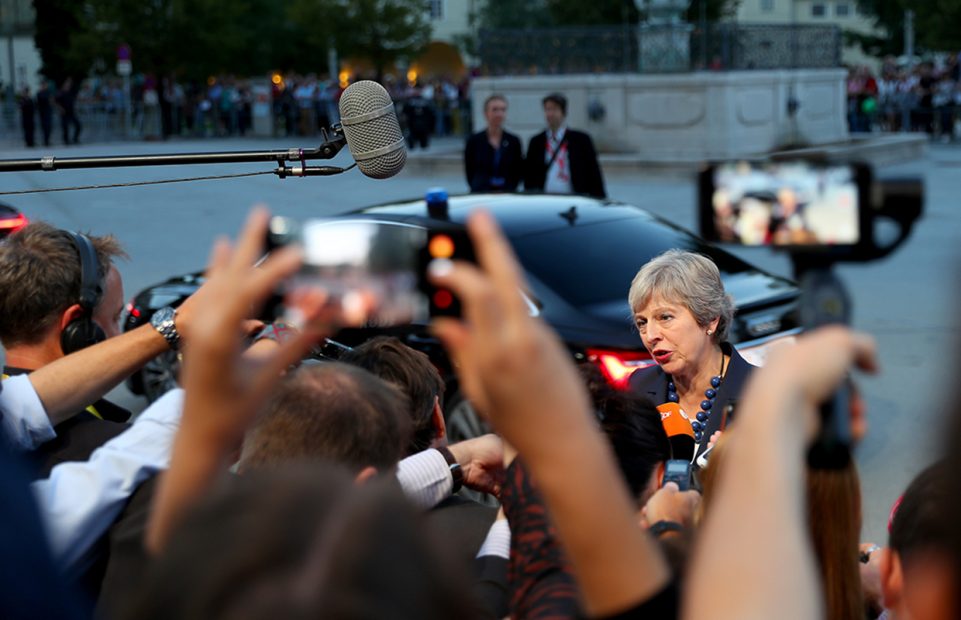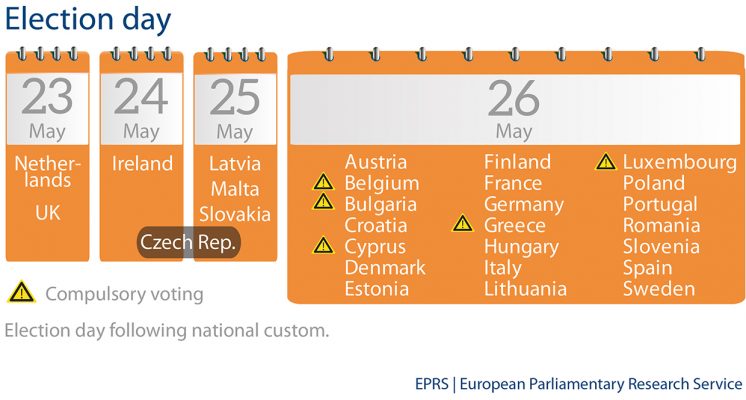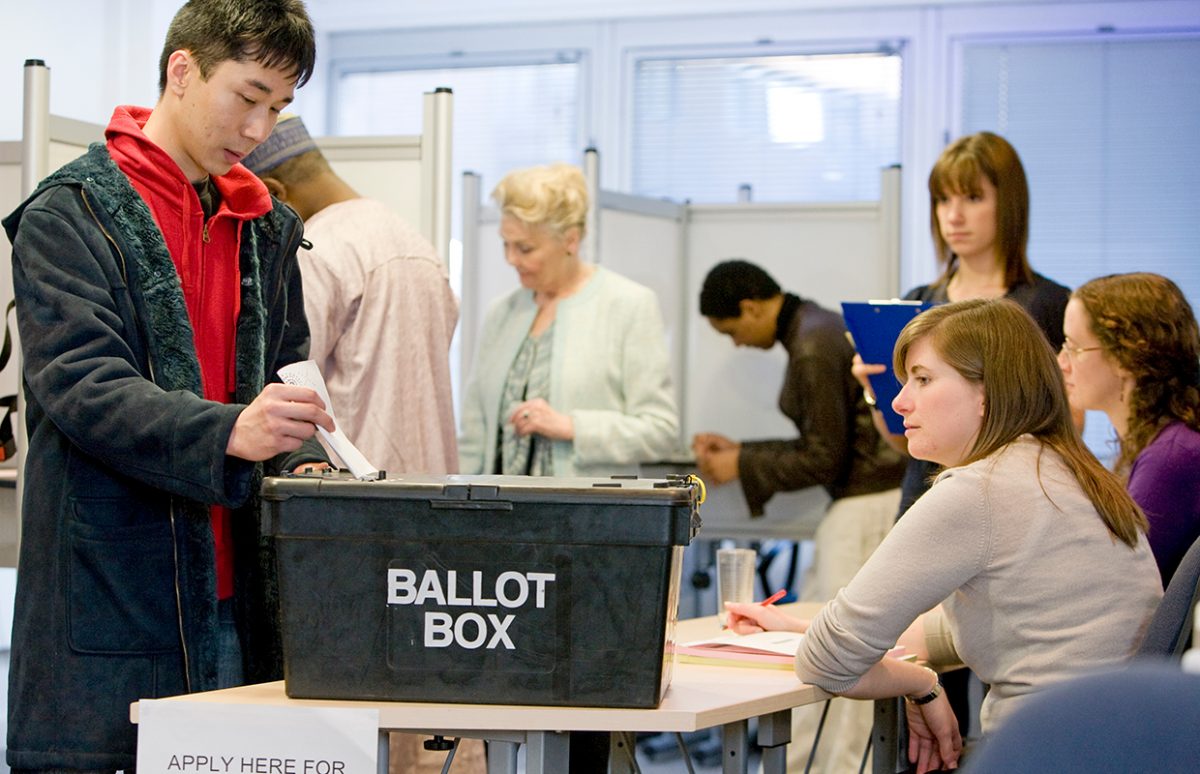Voting in the European Parliamentary elections started on 23 May in the Netherlands and the UK — where the elections weren’t supposed to take place at all. One more chapter in the chaos of Brexit.
The UK was supposed to leave the EU on 29 March, following the Brexit referendum. However, since the Conservative Government hadn’t managed to persuade Parliament to accept the leaving agreement negotiated with Brussels, they obtained a delay until 31 October. That meant they were legally obliged to organise the election. The elected MEPs may not even take their seats if a deal is signed soon. Although that is looking pretty unlikely since the Government’s own MPs have pushed Theresa May to resign as Prime Minister on 7 June.

Brexit Party
 In the meantime, the elections for the European Parliament have been dominated by the Brexit Party – led by Nigel Farage, who had been notably silent and absent from the British political scene since the referendum victory he had spent his entire political life working for. He reappeared and created a new party just in time for the European elections, since the party he founded, UKIP, wasn’t welcoming. In that bizarre European tradition, anti-Europe parties such as UKIP have often done well in European elections — the only national elections in the UK to use a proportional representation voting system, rather than the usual first-past-the-post, which favours the big traditional parties. In fact, it was UKIP’s victory in the 2014 European election, when they won the biggest share of the vote at 27.5%, that precipitated the Brexit referendum in the first place.
In the meantime, the elections for the European Parliament have been dominated by the Brexit Party – led by Nigel Farage, who had been notably silent and absent from the British political scene since the referendum victory he had spent his entire political life working for. He reappeared and created a new party just in time for the European elections, since the party he founded, UKIP, wasn’t welcoming. In that bizarre European tradition, anti-Europe parties such as UKIP have often done well in European elections — the only national elections in the UK to use a proportional representation voting system, rather than the usual first-past-the-post, which favours the big traditional parties. In fact, it was UKIP’s victory in the 2014 European election, when they won the biggest share of the vote at 27.5%, that precipitated the Brexit referendum in the first place.
The Brexit Party is campaigning for the UK to leave the EU straight away, with no deal, even though that is the only thing that Parliament has clearly made a stand on. The only one of the many Brexit votes to have passed was the one saying Britain shouldn’t leave without a deal. Farage’s erstwhile party, UKIP, has a similar message.
People’s Vote
 Another new party, this time opposing Brexit, is Change UK, formed by dissident Tory and Labour MPs in February. They demand a “People’s Vote”, a sort of second referendum before Brexit can happen.
Another new party, this time opposing Brexit, is Change UK, formed by dissident Tory and Labour MPs in February. They demand a “People’s Vote”, a sort of second referendum before Brexit can happen.
Several of the smaller mainstream parties have run clear anti-Brexit campaigns: the Greens, the Liberal Democrats, and the Welsh and Scottish Nationalist parties, Plaid Cymru and the SNP.
The Northern Irish parties are divided on Brexit, and the DUP, which supports Mrs May minority government on some issues, refused to accept her deal because of the “backstop” on the Northern Irish border, which would effectively leave Northern Ireland in the Customs Union indefinitely.
Tory and Labour
That leaves the two big parties, Conservative and Labour, who are expected to be the big losers of the election since both pay lip service to respecting the referendum vote and negotiating to leave, but neither seems capable of delivering it. Interparty talks which took place over the last few weeks ended in deadlock.
The Conservatives are torn between hardline Brexiteers who would leave with no deal, and moderates who reluctantly back Mrs May’s deal rather than none.
Many Labour members and supporters would rather Brexit was cancelled, but the party leadership insists on respecting the referendum vote. The party’s manifesto for the EU elections tries to leave every option open:
“Labour will continue to oppose the Government’s bad deal or a disastrous no deal. And if we can’t get agreement along the lines of our alternative plan, or a general election, Labour backs the option of a public vote.”
At the risk of voters being completely confused about what the Labour policy is.
 Although UK electors are voting on 23 May, because Thursday is the traditional day for elections in the UK, the results won't be released until Sunday 26, when all the EU countries have voted.
Although UK electors are voting on 23 May, because Thursday is the traditional day for elections in the UK, the results won't be released until Sunday 26, when all the EU countries have voted.
Copyright(s) :
UK Electoral Commission
10 Downing Street
Brexit Party
Change UK
European Parliamentary Research Service
> Brexit Chaos
> Brexit Confusion
> Brexit Update
> Australian Election Turnaround
> Brexit Referendum Webpicks
> Teaching about Brexit: Web Resources
Tag(s) : "Brexit" "Britain" "elections" "Europe" "European Union" "Northern Ireland" "politics" "referendum" "Theresa May" "UK"





